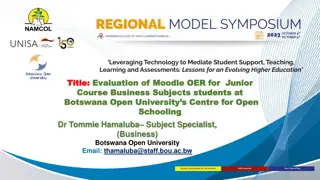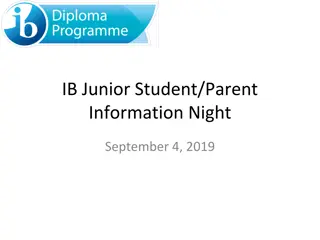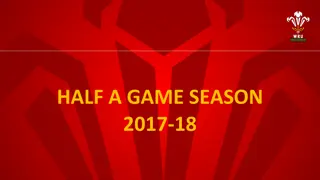
Manly Vale FC Junior Development Program and Mission for Football Players
Discover the Manly Vale FC Information Evening for Junior Coaches and Managers in the 2016 season, focusing on the Junior Development Programme for children aged 5-13. Learn about their mission to enhance player skills and passion for football while emphasizing intrinsic rewards over trophies. Find out why children play football and the importance they place on fun, friendships, and learning the sport.
Download Presentation

Please find below an Image/Link to download the presentation.
The content on the website is provided AS IS for your information and personal use only. It may not be sold, licensed, or shared on other websites without obtaining consent from the author. If you encounter any issues during the download, it is possible that the publisher has removed the file from their server.
You are allowed to download the files provided on this website for personal or commercial use, subject to the condition that they are used lawfully. All files are the property of their respective owners.
The content on the website is provided AS IS for your information and personal use only. It may not be sold, licensed, or shared on other websites without obtaining consent from the author.
E N D
Presentation Transcript
MANLY VALE FC Information Evening ~ Season 2016 For Junior Coaches & Managers
OUR JUNIOR DEVELOPMENT PROGRAMME For all children aged 5-13 years. Based on the current FFA National Football Curriculum. - The Discovery Phase (U6-U8). - The Skill Acquisition Phase (U9-U12). Designed for teams training at least once a week. To be used as a guide.
OUR MISSION To increase the skill level of all players, across all age groups, by maximizing participation and instilling a lifelong love of football.
WHY DO CHILDREN PLAY FOOTBALL? To have fun. To play with their mates and make new friends. To learn new skills and teamwork. To play a sport they can excel at. To emulate their football heroes. To try a different sport.
BUT WHATS MOST IMPORTANT TO CHILDREN? According to a recent survey, the 3 main reasons children play sport in Australia are: 1) To have fun. 2) To make friends. 3) To play and learn their chosen sport.
Did you notice that winning was not in the top 3? According to the same survey, children felt that winning was most important to: a) Their Coach b) Their Parents ~ Working With Kids Handbook 2015: Information for Coaches, Managers & Officials , A Football NSW Publication, p. 14.
Research has shown that intrinsic rewards, such as merely being involved in sport with their friends, mean more to children than the extrinsic rewards of receiving trophies or prizes. ~ Murray Halls, The Challenge of Engaging Young Children in Sport , Australian Sports Commission, Active After School Communities Program, Volume 28, No. 4. http://www.ausport.gov.au/sportscoachmag/coaching_processes/the_challenge_of_engaging_you ng_children_in_sport
Unless these needs are consistently being met, children are unlikely to continue playing football for very long.
OUR FOOTBALL PHILOSOPHY If we have the ball, the opposition can t score. Or . . . . . .
The better we are at keeping the ball, the less we have to defend.
Ive never forgotten the first thing they told me when I came to Barca as a little boy . here you can never give the ball away. ~ Xavi Hernandez, Barcelona midfielder
BUT WHAT DOES THIS MEAN? Football should be a joy to play and a pleasure to watch. Football should be about scoring more goals than the other team. All children are goal-scorers! The thrill of scoring goals is bound to instil a lifelong love of the game. Children should never be made to feel afraid of the ball. In short, children should be taught to treasure the ball and not to kick it away!
MVFC JUNIOR PLAYING STYLE STATEMENT An possession-based style of attacking football, characterized by clever combination play and creative individual skill.
OUR COACHING ETHOS Genuine individual player development must be embraced as a long-term process that aims to establish deep-seated patterns of behaviour amongst all footballers from an early age. Unlike senior coaches, who are concerned with preparing teams for their next match, the junior coach is instead responsible for preparing each player for a match in the distant future.
SEEING THE BIG PICTURE Our Junior Development Programme thus encompasses an 8- year plan designed to prepare players for the youth and senior level when winning trophies does become more important.
INDIVIDUAL PLAYER DEVELOPMENT BEFORE TEAM RESULTS During the regular season, the progress of any match whether positive or negative should never be deemed more important than the long-term development of each and every individual player. While, of course, winning is the purpose of any game, we must not allow this reality to occur at the expense of a child s development. The individual comes first, not the score!
Weekend competition matches merely present each child with an opportunity to put into practice the skills they have been learning at training as well as the learning they have acquired since they first started kicking a ball. The following tables demonstrate this:
LEARNING MATHEMATICS Classroom activities with the Teacher Sitting an Exam: 1. Student demonstrates what they have learned. 2. Teacher doesn t intervene and help the student. Preparation Test
LEARNING FOOTBALL Training activities with a Coach Playing a Match: 1. Player demonstrates what they ve learned. 2. Coach (or parent!) does not come onto the field to help the player (or play the game for them!). Preparation Test
As Coaches and dedicated supporters of our children we must view the training pitch and the playing field as part of the same classroom.
Question: Do parents turn up to training and start coaching players?
So, why do we still allow parents to deliver instructions and coach not just their own child but other players in the team from the sidelines???
MV CLUB DIRECTIVE: NO SIDELINE COACHING FROM PARENTS Let the Coach coach . One Coach = One Voice. Parents can barrack and cheer to their heart s content (positive!). Children need to learn the game for themselves. Children to need to make their own decisions without being told what to do all the time. Making mistakes is how they grow and learn the game.
LEARNING HOW TO PLAY THE GAME IS MORE IMPORTANT THAN WINNING A GAME Remember, the Junior Coach is concerned with how each player is developing towards becoming an accomplished footballer when it really counts at the youth and senior level. This means that on match-day, the overall focus should still be on the individual, not merely the team s performance. Whatever happens, this player-centred approach must never be abandoned on match-day simply because of the score!
MV CLUB DIRECTIVE: MANDATORY ROTATION OF ALL PLAYERS IN ALL POSITIONS (UNTIL U13) Increases game awareness. Enhances technical development by maximizing participation and contact with the ball. More touches = greater improvement. Provides all players with an opportunity to score a goal irrespective of whether their team is winning or losing . All players need to learn how to attack and how to defend. Reduces boredom and drop-out. Increases confidence and self-esteem.
By the end of the season, every player must have played at least half a game in every position.
In the past, the only reason why Coaches played kids in the same positions every week WAS TO WIN. Stronger players in the key positions. TOO EASY! Weaker players where are they unlikely to see much of the ball and thus make less mistakes. TOO EASY!
Young kids should be taught how to play in every area of the pitch, not taught to play a specific role. They don t need to be taught a role because it is innate. Every player has a natural disposition towards one role or another, but first they have to learn how to play everywhere. ~ Marcello Lippi, Former Italian National Team Coach & 2006 World Cup Winner.
WHAT IS TALENT? Talent means being able to repeat a skill effectively and consistently over an extended period of time. Is talent innate? ( in the genes ) Think of the world s greatest footballers (Pele, Messi). How many times have you heard someone say . . . . They were born with something I wasn t born with. They are gifted.
Todays concept of talent is still part of an old cultural legacy.
Dont ask, young artist, what is genius? Either you have it or you don t. ~ Jean-Jacques Rousseau, French Philosopher,1792 (!)
If we continue to believe that attaining excellence hinges on natural talent, our children are likely to give up if they show insufficient early promise. Perfectly rational given the premise! But . . . .
People make a great mistake if they think that my art has ever come easily to me. Nobody has devoted so much time and thought to composition as I. ~ Mozart
I make many changes and reject and try again, until I am satisfied. Only then do I begin the working-out in breadth, length, height and depth in my head. ~ Beethoven
Contrary to what weve been taught, genes do not determine physical and character traits on their own. Rather, they interact with the environment in a dynamic, ongoing process that produces and continually refines an individual. ~ The Genius in All of Us: Why Everything You ve Been Told About Genetics and IQ is Wrong , Dr David Shenk, Random House, 2010, p. 13.
Talent is the result of something, not the cause. Effort and practice. Environment. Unusual circumstances.
DONT FORGET THE RULE OF 10,000 HRS! It is generally accepted that it takes around ten years of purposeful practicing and playing to progress from first experiencing football to being able to function successfully as a player in a competitive 11v11 game. It is only after this time that we begin to see more talented players emerging . . . . .
Of course, nobody can claim that a person who has performed 10,000 hours of practice is guaranteed greatness. The science has merely shown this to be one of the necessary conditions of extraordinary achievement. In essence, there is a vast difference between practice and deliberate practice. . . . . . . And deliberate practice is tough!
PROMOTING A GROWTH MINDSET At Manly Vale we believe the key difference in skill level between all our junior players is due to the amount of time they have each spent on the ball from a young age. That s why we believe every junior has the potential to become an accomplished footballer in the future.
As a grassroots club it is thus our responsibility to reduce the gap in ability between all players by ensuring everyone is given the same training and learning opportunities. Hence, our new Junior Development Programme.
Practice makes Permanent. ~ Bobby Robson
HOW A GROWTH MINDSET WORKS FIXED MINDSET Talent = innate Failure = de-motivation No Perseverance I don t have the talent so I ll never be able to do this. GROWTH MINDSET Talent = trainable and coachable. Failure = extra motivation Strong Perseverance I can learn and improve through effort and practice. OUTCOME Achievement of mediocrity. OUTCOME Achievement of excellence.
WHAT COACHES AND SUPPORTERS CAN DO TO INSTIL A GROWTH MINDSET Praise effort, not talent. Teach players to see every mistake as a learning opportunity. If you re not making mistakes, you re not improving. Making mistakes is also a biological requirement for learning skill. Teach players to play without fear of failure. Kids are much harder to coach if they play with fear. Ensure challenges are not too difficult and not too easy, but just out of reach.
True motivation comes from finding the ideal point of being challenged. When kids are overly challenged, they may give up because the expectations are too high. If they re not challenged enough, they may become bored. ~ Mindset: The New Psychology of Success , Dr Carol Dweck.
As Coaches we must strive to find the right balance for our players whenever possible






















